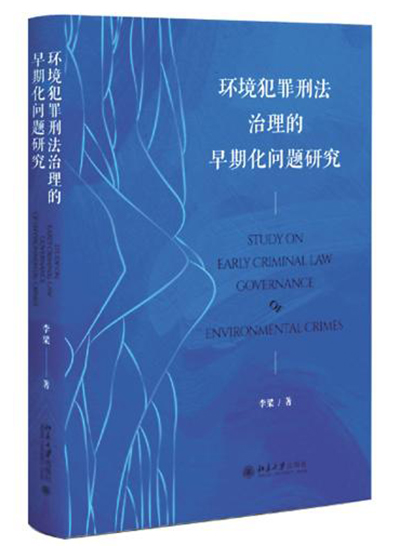Criminal law responds to ecological civilization construction

Study on Early Criminal Law Governance of Environmental Crimes
Since the introduction of the ecological civilization strategy, scholars have worked diligently to explore how criminal law can effectively contribute to this vision. Study on Early Criminal Law Governance of Environmental Crimes, authored by Professor Li Liang from the Law School at Minzu University of China, provides a significant academic contribution by outlining a vertical framework for criminal law’s role in advancing ecological civilization.
Li argues that the early application of criminal law to environmental crimes is evident in both substantive and procedural law. Substantively, this approach is reflected at both the objective and subjective levels. On the objective level, it includes the widespread recognition of potential harm offenses and treating preparatory and aiding acts as punishable crimes. Subjectively, it encompasses the extensive punishment of negligent acts and, in some cases, the imposition of strict liability for specific environmental crimes. Procedurally, early governance is characterized by the reversal of the burden of proof through causality presumptions and the direct penalization of environmental crimes by administrative authorities.
In Li’s view, the positivist concept of criminal law, the risk society theory, the concept of “severity without harshness,” and the idea of balancing leniency and strictness all provide theoretical support for the early criminal law governance of environmental crimes. The positivist criminal law perspective emphasizes moderate criminalization, advocating for early intervention in environmental crimes from a longitudinal perspective. The risk society theory, when applied to the governance of environmental crimes, prioritizes risk prevention over post-incident sanctions, thereby necessitating earlier legal action. The concept of “severity without harshness” highlights the need for a comprehensive legal framework, inherently supporting early intervention. Finally, the principle of balancing leniency with strictness underscores the importance of lighter penalties in conjunction with a rigorous legal structure, further reinforcing the rationale for early criminal law governance in addressing ecological crimes.
The author observes that China’s criminal law exhibits a relatively low degree of early-stage governance in addressing environmental crimes, as reflected in the categorization of offenses, the legislative treatment of culpability, the types of legal interests protected, and the design of special legal frameworks. To enhance early-stage governance, substantive law should fully define the basic offenses of environmental crimes as potential damage offenses and ensure the comprehensive penalization of negligent crimes. Building on this, strict liability should be selectively introduced for specific types of environmental offenses. In procedural law, efforts should focus on integrating the collection and use of evidence from administrative law enforcement and environmental crime investigations. This includes establishing collaborative and simultaneous investigation models and legalizing the presumption of causality, thereby ensuring more effective governance of environmental crimes.
Su Yongsheng is a professor from the Law School at Hebei University.
Edited by YANG LANLAN
